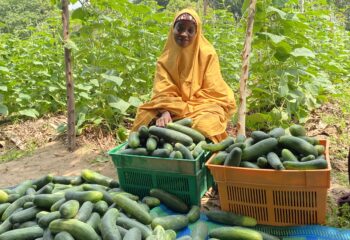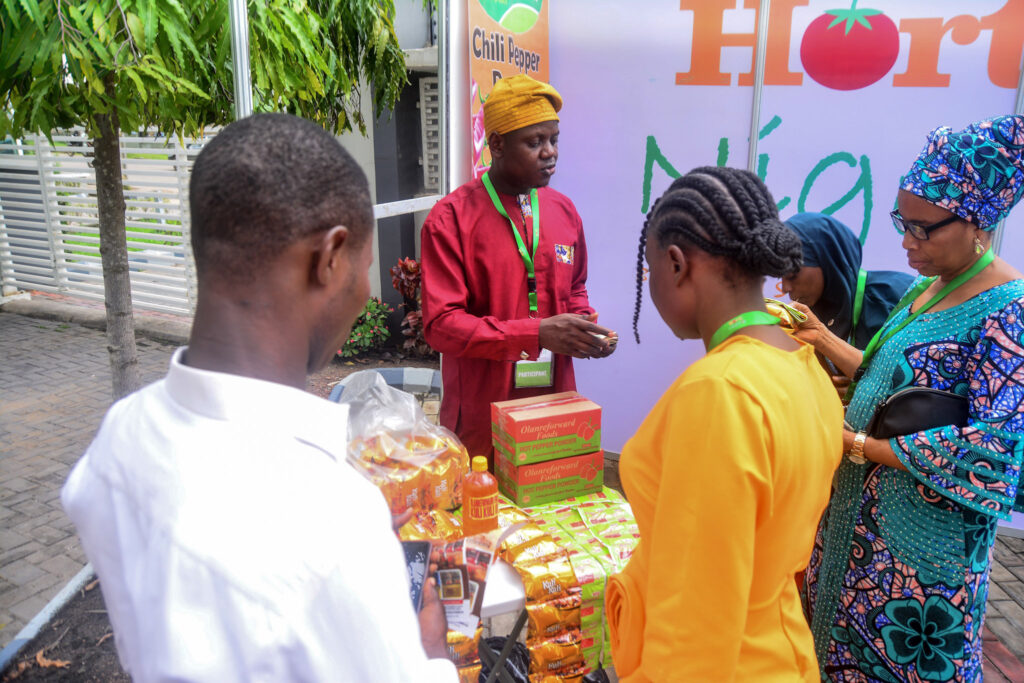
On September 16-17, horticulture stakeholders from across Nigeria gathered at the Golden Tulip Hotel in Oyo State for the 2025 HortiNigeria Learning Event under the theme “Catalyzing Sustainability and Inclusion Through Stakeholder Engagement in Nigeria’s Horticulture Sector.”
The two-day forum convened farmers, policymakers, researchers, private sector actors, and development partners to reflect on progress, share learnings, and chart the future of Nigeria’s horticulture sector.
“The program gave me access to opportunities, connections, and the support I needed to expand my farm and scale onion production successfully. What started as a small idea has now become a model for other farmers in the region.”
Abraham Ogundijo, young entrepreneurial farmer
Opening the event, Monitoring, Evaluation, and Learning (MEL) Coordinator Mary Omolola Onaolapo presented a progress review highlighting key milestones across the program’s focus states, followed by the premiere of the HortiHeroes documentary, an inspiring collection of stakeholder success stories shared by Communications Coordinator Feyikemi Adurogbangba.
From Aid to Trade: A Necessary Shift
A key topic throughout the event was the call to transition from aid to trade. While donor support has been instrumental in jump-starting interventions, speakers stressed that the future must be built on sustainability, market alignment, and value chains that deliver commercial returns.
Mohammed Salasi Idris, Program Director of HortiNigeria, emphasized the need for this transition stating, “Aid and grants have been essential to kick-start interventions, but the future lies in scaling commercial production, strengthening trade links, enhancing cold chain infrastructure, and pushing policy reforms that make horticulture attractive to investors.”
This mindset resonated across sessions: instead of perpetuating dependency, HortiNigeria is working to support farmers in building viable agribusinesses, connecting to markets, and adopting innovations that allow them to thrive beyond the program’s life.
Stakeholder Endorsements
During the event, high-level voices emphasized horticulture’s growing importance to Nigeria’s economy. Bengt van Loosdrecht, Ambassador of the Kingdom of the Netherlands, praised the HortiNigeria program’s scale and inclusivity. He was particularly impressed with how more women are becoming farmland owners and young graduates are choosing agribusiness, thus changing the narrative of the sector and the country at large.
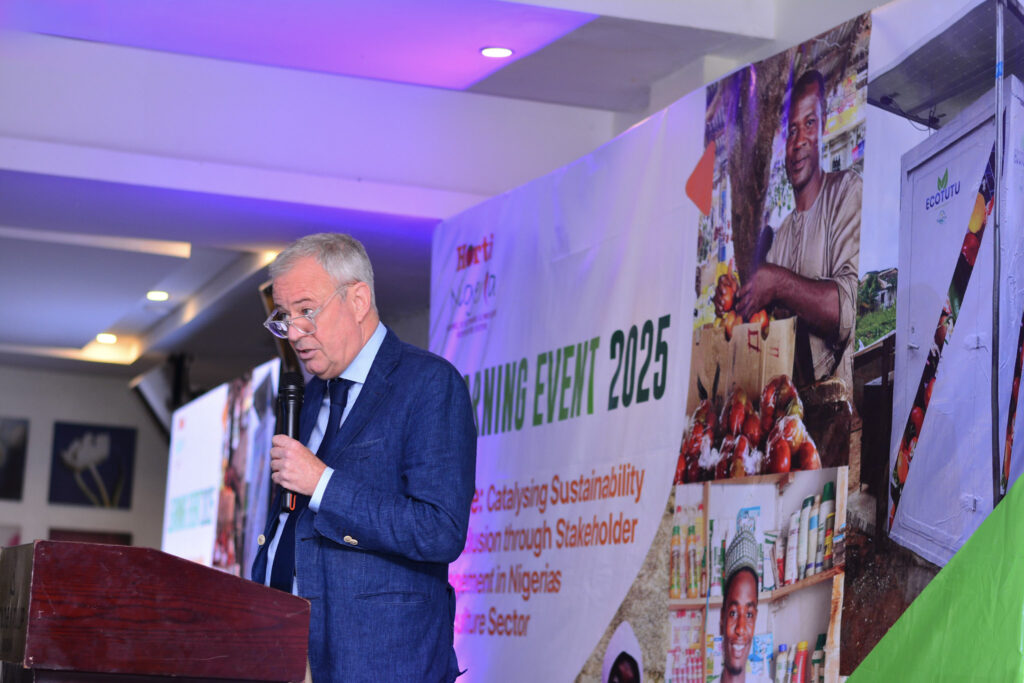
Senator Abubakar Kyari, Minister of Agriculture and Food Security, represented by the Director of the Horticulture Unit, delivered a goodwill message on the government’s role in sustaining momentum. He indicated the need for sharing lessons learned and fostering collaboration to harness the horticulture sector’s potential. Commissioners of Agriculture from Oyo, Ogun, and Lagos states through their representatives also reaffirmed horticulture’s strategic role in state-level economic plans.
Intellectual Debate, Policy Discourse, and Award Recognition
The learning event served as an engaging platform for intellectual exchange and policy dialogue on key challenges affecting Nigeria’s horticulture sector, including importation, smuggling, and weak regulatory enforcement. It also honored the outstanding contributions of individuals and institutions driving progress and innovation across the value chain.
Among those recognized was Abraham Ogundijo, a young entrepreneurial farmer from Ogun State, who is pioneering large-scale onion cultivation in the South-West — a groundbreaking initiative for the region.
Reflecting on his journey, he said: “The program gave me access to opportunities, connections, and the support I needed to expand my farm and scale onion production successfully. What started as a small idea has now become a model for other farmers in the region.”
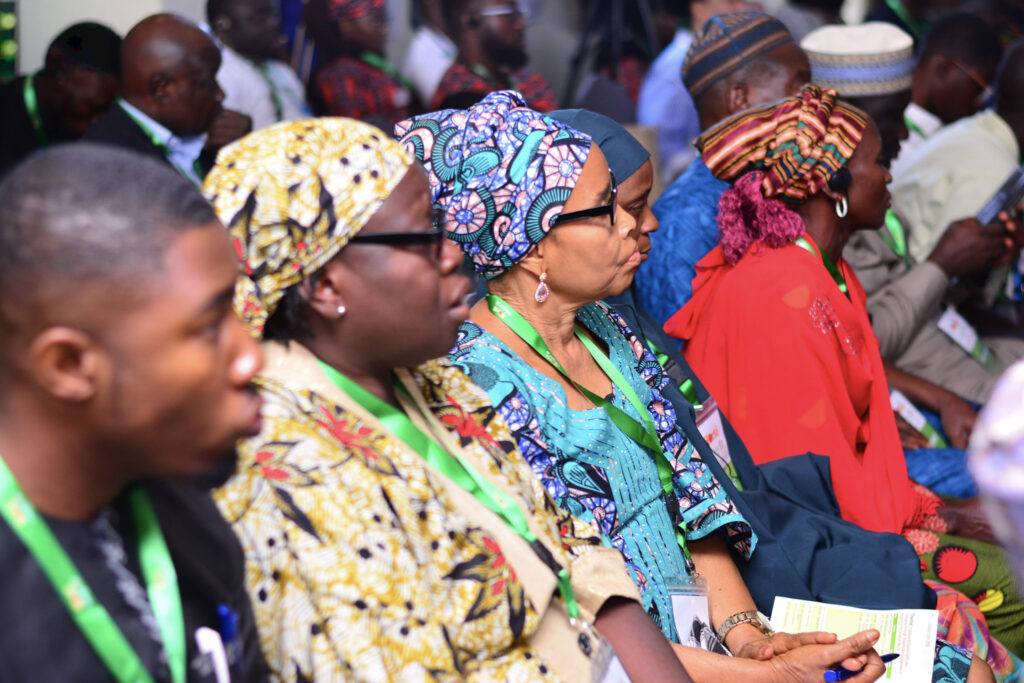
Policy discussions during the event underscored the need for stronger regulatory frameworks, enhanced oversight by the National Agency for Food and Drug Administration and Control (NAFDAC), and coherent policies to safeguard domestic producers and ensure fair market competition.
Breakout sessions focused on themes such as advocacy, youth engagement, business-to-business (B2B) linkages, technology pilots, and sustainability of project results.
The discussions and sessions translated into tangible outcomes, as reflected in testimonials from project partners. These included:
- Umar Mai Solar, a smallholder farmer from Kano State, who reported doubling his yields through the use of solar-powered drip irrigation
- Amina Mohammed Sani, owner of Mix Condiment Paste in Kano, who shared how capacity-building initiatives strengthened her business resilience
- and Mary Yakubu, a small-scale farmer in Kaduna, who described the transformative effect of technology adoption on her farm productivity.
Participants also took part in field visits to the National Horticultural Research Institute (NIHORT), where they observed practical innovations demonstrated to stakeholders from both Nigeria and the Netherlands, including integrated pest management strategies for Tuta absoluta.
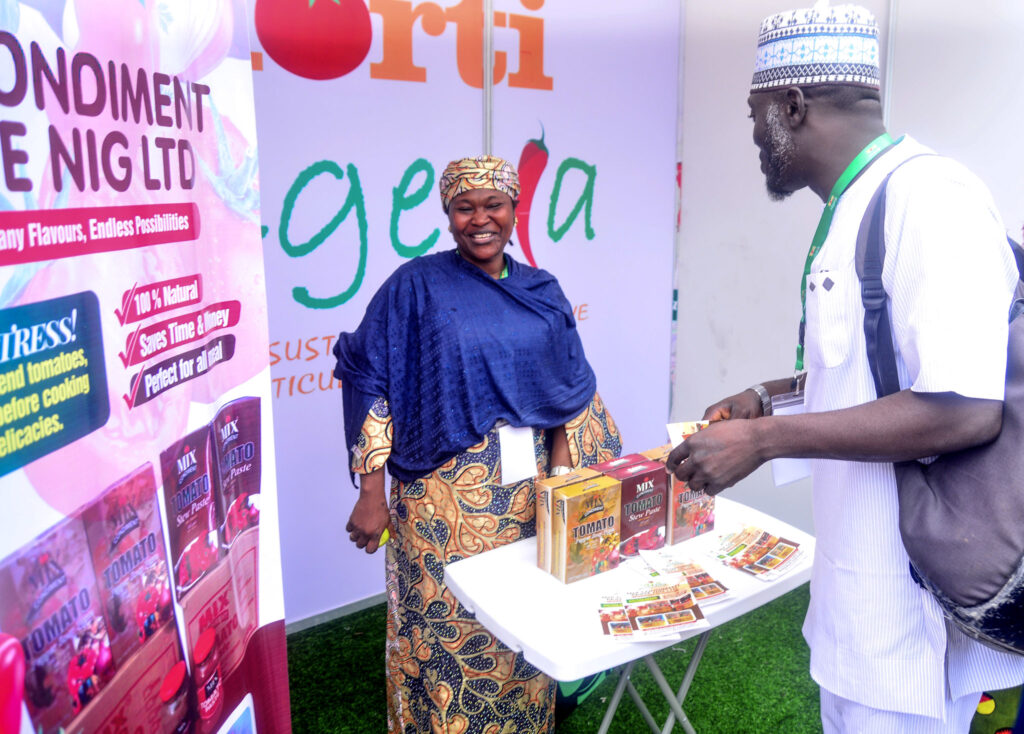
Strategy Going Forward
Insights shared during the event were shaped into five strategic priorities:
- Strengthening Cold Chain and Other Infrastructure – Investing in storage, processing, and logistics, such as the new cold storage facility developed with NIHORT.
- Reorienting Toward Market-Based Models – Shifting from aid-driven to market-driven approaches that sustain long-term profitability.
- Deepening Youth and Women Inclusion – Building on inclusive achievements with continued mentorship, access to finance, and targeted support.
- Mobilizing Finance and Policy Reforms – Lowering lending barriers, improving banks’ perception of horticulture, and enacting smart regulations.
- Policy and Enforcement Synergies – Tackling smuggling, strengthening standards, and enhancing coordination across agencies.
The 2025 HortiNigeria Learning Event was more than an opportunity to review the program’s achievements — it marked the beginning of an inclusive, trade-driven, and sustainable horticulture sector in Nigeria.
By combining farmer testimonies, stakeholder endorsements, and a clear strategic roadmap, the event demonstrated that Nigerian horticulture is not just a means of subsistence; it is rapidly becoming a transformative driver of agriculture, trade, and food and nutrition security.
HortiNigeria (2021-2025) is funded by the Embassy of the Kingdom of the Netherlands in Nigeria and implemented by IFDC, together with KIT Institute and East-West Seed Knowledge Transfer Foundation (EWS-KT).




